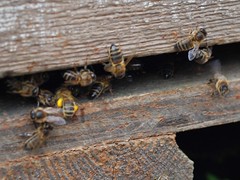 Although I can't really be sure if they are new this year or overwintered. See one of them has orange legs - this is a good sign - bringing pollen back in.
Although I can't really be sure if they are new this year or overwintered. See one of them has orange legs - this is a good sign - bringing pollen back in.
Today was a lovely warm still sunny day in Cambridge and environs, and at this time of year a middle-aged mans thoughts turn to the jungle at the end of the garden, and how he really ought to make some effort to tame it. So I boldly set out and hacked a path through; it is now possible to get down to Bin Brook for the first time in... quite a while. The Cambridge Preservation Society have been busy tidying up on the other side (the lane that used to take tractors had shrunk down to a narrow path barely passable in high summer), so we now have freedom to roam, hurrah. I also hacked down some brambles round the old apple tree, and we went to the Orchard to buy more pansies and a miscellany of other plants, few of which saw the earth today. Though we did get two rows of carrots in, and some nice red things whose name keeps escaping me. They are sort of droopy upside-down things.

Dr Connelly.
Bees are a worry for me too : we have a small orchard where the almond trees are blossoming, and the apricots about to.
In the SW of France where I sometimes live there seem to be many varieties of bees wasps and hornets. Our problem is the import of the Asian hornet which apparently arrived on some sort of cargo some time ago and which eats bees. Pollination is a problem with a depleted bee population.
I inspected the rosemaries this weekend (22C this Sunday) and I thought that the number of bees was reduced.
If the Asian hornet spreads north, and I have no reason to doubt this will happen, you Brits need to watch out.
I managed to find a wild honey bee hive ina tree a couple of weeks ago, which was heartening with all the bad news about bees.
Eachran - have you seen these Asian hornets? I only ask as
The British right wing papers warn of their impending arrivial every year but they never do, and I heard this was because there not even in Europe. The 'Asian hornets' I'm told are just queen european hornets that have been misidentified (ive seen at least one case of this online), but I'd be interested to know if they are actually here
But, but, but what happened to your ice age that was so recently in the headlines? Surely the Torygraph must be just making this up.
Fortunately Scotland doesn't disappoint, what with lots of cold rain and gales, which is to say it might as well be summer. :)
Good for the bees. Bees rule.
Steve,
We had an inch of snow which lay as slush. That caused gridlock in Wimborne Minster, Dorset. No-one under the age of thirty had seen snow before!
Cheers, Alastair.
Neil, I havent seen them but many have.
There was a lot of press coverage in SW France last year complete with pics of the monsters and their nests. Advice was given how to kill them ecologically involving brown beer traps (I kid you not). I tried with guinness, but only a little since it is my favourite drink : I didnt catch any.
The problem seems to be that like Polish plumbers in the UK, Chinese hornets might be blamed unfairly. Bees do tend to be disappearing rapidly though and it is of great concern in the SW of France. Why they are disappearing no-one seems to know right now but the presence of Chinese hornets cant help.
There is less buzz around the house this year than last : the bees tend to nest in the crevices of the stone walls creating a home in the straw and clay which binds the stone together.
If you wikipedia for France and if you can read French then look at http://fr.wikipedia.org/wiki/Vespa_velutina.
A few years ago in France, I watched what I believe were numbers of Vespa velutina on a Japanese knotweed [Fallopia japonica] growing in the Venise verte. I saw one demolish a common wasp in short order.
Their colouration triggers a powerful aversion response.
I can imagine that they could demolish honey bees easily.